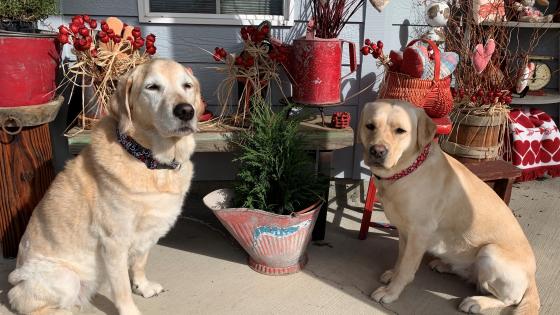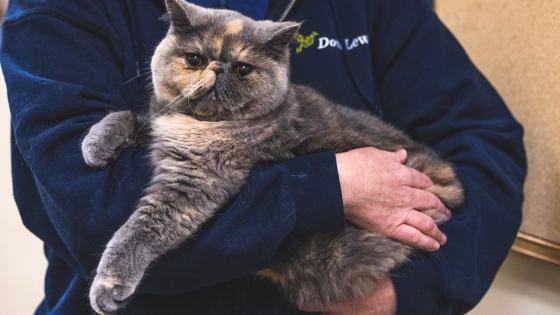
Valentine’s Day Hazards for Pets - There’s More than Chocolate
Valentine’s Day Hazards for Pets - There’s More than Chocolate
PORTLAND, Ore.—Veterinarians at DoveLewis Emergency Animal Hospital are spreading the love with a reminder and safety tips just before Valentine’s Day. While there are many hazards, chocolate ingestion is what most pet owners think about during the holiday.
Just this week Kenny Crippen and his wife brought their seven year old Puggle, Eleanor, to DoveLewis for chocolate toxicity. Eleanor was out of sight and it wasn’t until later that they realized she had ingested chocolate. ”We noticed Eleanor was throwing up and even defecated in the house, which wasn’t normal for her” said Kenny. “She was also displaying signs of distress like heavy breathing and panting.” They found that their sweet Puggle had snuck into the kitchen shelf and pulled out a basket to retrieve a bag of chocolate chips. At first they weren’t sure how much she had eaten, but they ultimately found she had eaten almost the entire bag of chocolate chips.
Eleanor spent a night in the ICU being treated for chocolate toxicity at DoveLewis. She was giving activated charcoal to trap toxins preventing further absorption, fluids to offset dehydration and anti-nausea medication. Eleanor was also connected to a heartrate monitor overnight for continuous monitoring, because her heart rate was elevated. She was able to return home on Wednesday, just days before Valentine’s Day with her loved ones.
Common hazards for pets during Valentine’s Day include chocolate, xylitol, alcohol, flowers and gifts.
Chocolate
Chocolate is toxic to animals because of the cacao bean as well as the caffeine present. And the more cacao bean in chocolate, the more dangerous the chocolate becomes to pets. Common signs that an animal may have ingested chocolate include: excitement, nervousness and trembling, vomiting and diarrhea, excessive thirst and urination, muscle spasms and seizures, comas and, in severe instances, death.
Xylitol
Food containing Xylitol should be kept away from pets, specifically dogs. Xylitol is a common sugar substitute providing sweetness without calories, which can be found in some sugar-free products such as chewing gum, mints, vitamins and toothpaste. If ingested by your pet, this ingredient can cause vomiting, diarrhea, weakness, ataxia, hypoglycemia, seizure, and in extreme cases, liver failure.
Alcohol
Alcohol consumption can cause vomiting, diarrhea, staggering, central nervous system depression, difficulty breathing, tremors, comas and even death in pets. Most alcohol ingestion occurs as a result of animals drinking from unattended glasses, so keep a watchful eye on your glass and your pet if you will be enjoying a beverage at home.
Flowers
Caution should be used when choosing and displaying flowers for your loved ones. Lilies should be kept away from cats. Varietals such as Tiger Lilies and Easter Lilies may cause feline acute kidney failure if ingested. Other types of lilies, including Peace Lilies and Calla Lilies, cause gastric and oral irritation and vomiting if ingested. Even roses can pose a hazard with their thorns.
Gifts
Giving a gift to a loved one on Valentine’s Day can be fun, as long as someone else doesn’t get into it first. Make sure your gifts are not just hidden from the recipient, but also out of your pet’s reach especially if potentially hazardous to them. Care should also be taken with wrapped gifts, because enticing items such as bows, ribbon and other adornments can be ingested or cause choking.
If you suspect your pet has ingested any hazardous items, call DoveLewis or your regular veterinarian immediately.
###



